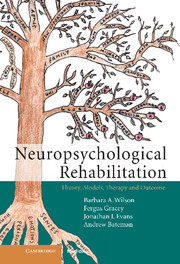Book contents
- Frontmatter
- Contents
- List of contributors
- Foreword by Keith Cicerone
- Preface
- Section 1 Background and theory
- 1 Towards a comprehensive model of neuropsychological rehabilitation
- 2 Evidence for the effectiveness of neuropsychological rehabilitation
- 3 Goal setting as a way of planning and evaluating neuropsychological rehabilitation
- 4 The Oliver Zangwill Centre approach to neuropsychological rehabilitation
- Section 2 Group interventions
- Section 3 Case illustrations
- Section 4 Outcomes
- Index
- Plate section
2 - Evidence for the effectiveness of neuropsychological rehabilitation
from Section 1 - Background and theory
Published online by Cambridge University Press: 03 March 2010
- Frontmatter
- Contents
- List of contributors
- Foreword by Keith Cicerone
- Preface
- Section 1 Background and theory
- 1 Towards a comprehensive model of neuropsychological rehabilitation
- 2 Evidence for the effectiveness of neuropsychological rehabilitation
- 3 Goal setting as a way of planning and evaluating neuropsychological rehabilitation
- 4 The Oliver Zangwill Centre approach to neuropsychological rehabilitation
- Section 2 Group interventions
- Section 3 Case illustrations
- Section 4 Outcomes
- Index
- Plate section
Summary
Introduction
Although, as argued in Chapter 1, neuropsychological rehabilitation is partly concerned with the remediation or alleviation of emotional, behavioural and motor consequences of brain injury, it is probably true to say that the major role of neuropsychological rehabilitation is the treatment of cognitive deficits resulting from damage to the brain. What exactly is meant by the term ‘cognitive rehabilitation’? It is certainly aimed at a number of different cognitive functions including memory, attention, problem solving, communication, perceptual and spatial deficits. It should encompass methods for restoring cognitive functions and methods to teach compensatory strategies. It should also be concerned with reducing problems faced in everyday life. As indicated in Chapter 1, we need to recognize that rehabilitation is an interactive process involving the disabled person, therapeutic staff and, where possible, relatives and members of the wider community. As a consequence of these views, we suggest that cognitive rehabilitation is a process whereby brain injured people work together with healthcare professionals to remediate or alleviate cognitive deficits arising from a neurological insult. We are particularly concerned here with people who have sustained a non-progressive insult to the brain such as traumatic brain injury (TBI), encephalitis, hypoxic brain damage or a stroke. This is not to deny the value of rehabilitation for people with progressive conditions such as Alzheimer's disease and we accept that some valuable work is being done in this area (Clare and Woods, 2001).
- Type
- Chapter
- Information
- Neuropsychological RehabilitationTheory, Models, Therapy and Outcome, pp. 22 - 36Publisher: Cambridge University PressPrint publication year: 2009
- 10
- Cited by



